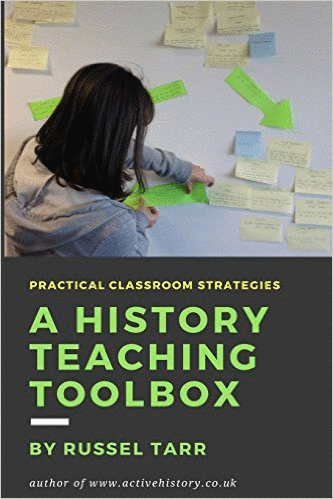Transform your history classroom
ActiveHistory provides educational, award-winning interactive simulations, decision-making games, self-marking quizzes, high-quality worksheets and detailed lesson plans for the school history classroom. All resources have been designed by full-time history teacher Russel Tarr.
An ActiveHistory subscription provides everything you need to construct and deliver a History course from start to finish for the entire 11-18 age range!
These consist not just of lesson plans, worksheets and teacher notes, but also multimedia lectures and interactive games and historical simulations ideal for remote learning and self-study.
Republican and Imperial Rome: worksheets, lesson plans and interactive resources for the school history classroom.
 Decision-Making Adventure: Undercover in Imperial Rome
Decision-Making Adventure: Undercover in Imperial Rome
This simulation is designed to provide students with an engaging, enjoyable and rigorous introduction to Imperial Rome. As they journey around the virtual landscape, they will learn about the main personalities and chornology of the Empire through the "Emperors" worksheet, and learn about the main achievements and inventions of Rome through the "Roman Holiday" worksheet. Ideally, students should complete both worksheets, but they work as stand-alone resources and so are very flexible: for example, you may wish to set half of the class on one worksheet, and half on the other. Each worksheet comes with suggested extension tasks.
- PowerPoint Introduction
A short PowerPoint introduction to outline the purpose of the simulation and the learning outcomes that will result. - Map, Structured Questions and Timeline | Completed Teacher Version
In this task, students will use the interactive adventure to complete a schematic map which quickly allows you to identify the main sites and Emperors in Ancient Rome according to the simulation. There are then a detailed list of structured questions for each of the main locations, and 'fill the gaps' timeline exercise. - FACTUAL TEST
In this task, students are given 25 short-answer questions to test the knowledge they acquired by completing the main worksheet which accompanies the game about Imperial Rome. - Roman Holiday | Venn Diagram comparing fun, interesting and relaxing places
In this task, you will use the interactive adventure to learn about some of the most interesting and important sights and events in Imperial Rome. You will use your findings to produce a tourist brochure designed to attract intrepid time travellers to visit Imperial Rome for themselves! - Emperors
In this task, you will use the interactive adventure to learn about some of the most interesting and important Roman Emperors. You will then conduct some independent research and use this to complete a creative project from a range of choices. The overall outcome is a thorough understanding of the successes and failures of each Emperor, and a good grasp of the chronology of the Empire.
Escape the Room! - Imperial Rome
An escape room is, according to Wikipedia, "a physical adventure game in which players solve a series of puzzles using clues, hints and strategy to complete the objectives at hand. Players are given a set time limit to unveil the secret plot which is hidden within the rooms". They are increasingly popular as team-building exercises as well as a fun leisure activity.
In the classroom, an "Escape the Room" format can involve students working together, against the clock, to solve a series of puzzles using existing and fresh knowledge from their studies and from clues and sources which have been left around the room. They can be great for introducing a fresh topic, consolidating existing knowledge and introducing fresh learning into the classroom in a fresh and engaging way.
"You are a team of famous archaeologists preparing an exhibition about the Roman Empire which is due to open in just 45 minutes. The prize exhibit has been locked away safely by your team leader, but he has now been kidnapped by a group of art thieves who are asking for a ransom. Your task is to crack the codes on the locks which will allow you to open the box, recover the priceless exhibit, and start charging people to visit your exhibition. If you fail to do so then you will not be able to raise the money for the ransom and your team leader will be lost forever!"
Scheme of Work
What is your Roman name?
In this activity students will work out what their names would have been if they had been alive during the time of the Roman Empire! Students will be organised into pairs and will use a detailed table to choose the most appropriate three-part name for their partner.
The Growth of the Roman Empire: Timeline and Mapping Activity
"On your map of the Roman Empire, colour code your map using the events listed here in bold to help you."
"In this timeline, highlight heroes of the Roman Empire in one colour, enemies in another and Roman monuments in another. A test may follow."
The Mystery of Pompeii 
"Before giving you this worksheet, your teacher will have shown you this image on the screen and asked you to formulate four questions. After class discussion, record these in the table below and note down possible answers (some of you may even KNOW some answers already!).
Your teacher will now deliver a lecture using an online slideshow presentation. For each slide, copy down the information you are given in column [2], and try to formulate a question to put into column [3]. After the presentation is finished, work with a partner to come up with possible answers to record in column [4].
Each member of the class will be given an piece of evidence from this sheet of information slips by the teacher. Copy down what it says here, and then consider if it helps to answer any of the questions we have now identified. If you have time, bring your completed slip back to the teacher to receive a second and even a third.
Now discuss with other people on your table what you have learned, and record answers to your questions as appropriate. Your teacher might then "jigsaw" the groups and repeat this process. End by having a whole-class discussion about which answers are certain, which are likely, and which are possible"
Roman Holiday! - Part 1: Research
"In this activity you will work in teams. You will design a guided tour which you hope to sell to a customer (your teacher). The class will be arranged into two teams. Each member or each team should choose two sites from different categories in this list to research further. The teacher might arrange this so that a member of the first team chooses first, then a member of the next team, and so on until all students in all the teams have made their choices. Each site should be chosen by only one person in the class if this the size of the class makes this possible".
Roman Holiday! - Part 2: Presentations
"
Your teacher will give each team an A3 copy of this Venn diagram. Each team should nominate a scribe. This person should ask each member of the team what site(s) they researched, and write these into the Venn diagram in the appropriate place after discussion. Next, your teacher will take the role of a "Time-Travel Holiday Agent" who has clients that want a FUN holiday. You will have two minutes to decide what will be included in your tour. Each team will then present to the teacher their proposed holiday package and the teacher will declare a winner. The process will then be repeated for an "Interesting" holiday and a "Relaxing" holiday. For homework, you may be asked to produce a travel brochure to sell your holiday".
Gladiatorial Combat - A Roleplay Game! | Accompanying question sheet
"In this activity you will learn all about Roman Gladiators. You will complete a playing card all about your gladiator, then take the role of a gladiator and use your knowledge to help you win in a series of 'battles' against your opponents. Remember: Knowledge is Power!"
Who was the most interesting Roman Emperor of all time? | Research Prompt Sheet - a classroom debate
In this activity, students research different emperors. They can then present their findings in a whole host of ways: through a balloon debate (my favoured approach!), a biopoem, a diamond diagram, and many others which are suggested within the worksheet.

Why did the Roman Empire Fall?
In this exercise, created using the ClassTools Hexagons Generator, pairs of students are given a sheet of factors explaining the collapse of the Roman Empire in the West. They cut these out and then organise them into meaningful categories, each with a title which makes it clear how they contributed to the fall of the Empire. Here is a detailed blogpost about the hexagons approach. In a second lesson, students can connect the groups with arrows and explanations and then turn their findings into a proper written piece to develop their essay-writing skills.

Revision / End of Unit Quizzes

© 1998-2025 Russel Tarr, ActiveHistory.co.uk Limited (Reg. 6111680)
1 Torrin Drive, Shrewsbury, Shropshire, SY3 6AW, England
Privacy Policy | Contact






